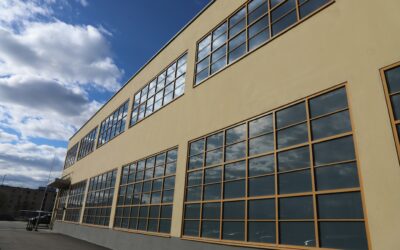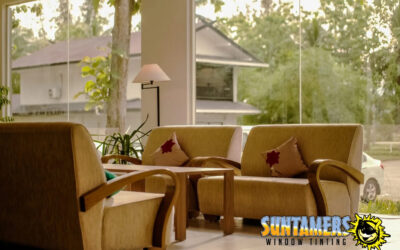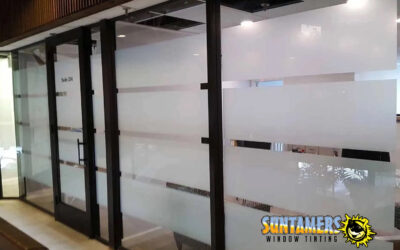Are you aware that your skin is susceptible to UV damage from the sun when you are inside? A recent article in Business Insider called “You can get sun damage through a window — here’s how to protect yourself indoors” by Madeline Kennedy discusses this. With Summer just kicking off, we wanted to share some information from the article about how to prevent skin damage when spending time near windows.
 Many people think because they do not get a sunburn while inside and behind glass that skin damage isn’t occurring. The reality is that you will not get sunburned indoors or in your vehicle behind the windows because most types of glass block UVB rays. UVB is the type of light that causes sunburns and tans. However, glass does not block UVA rays. These rays are the type that cause skin damage, wrinkles and even some types of cancer.
Many people think because they do not get a sunburn while inside and behind glass that skin damage isn’t occurring. The reality is that you will not get sunburned indoors or in your vehicle behind the windows because most types of glass block UVB rays. UVB is the type of light that causes sunburns and tans. However, glass does not block UVA rays. These rays are the type that cause skin damage, wrinkles and even some types of cancer.
As Madeline writes in the article, “Most of us know to wear sunscreen when we’re outside in the sun, but you may need to take the same precautions when driving for long periods or sitting next to a sunny window at home.” This is exactly right. Most people are educated enough to understand the need for sunscreen when outdoors, but do not give it a second thought when near a window or in their vehicles.
This article goes on to share a quote from R. Sonia Batra, MD, a dermatologist in Santa Monica, California. “People often have a false sense of security in their cars or behind windows since the UVB rays that cause a quicker sunburn are blocked…However, the UVA rays that penetrate glass actually reach a deeper layer of skin and still cause sun damage, discoloration, and wrinkles.”
Madeline also shares “If you are just sitting in a room lit by sunlight, you are not likely to get sun damage, but if you are positioned next to a window getting direct sunlight for many hours of the day, you may want to take precautions. Batra also shares, “I usually recommend a mineral-based, physical sunscreen with zinc oxide or titanium dioxide and at least an SPF of 30. Mineral sunscreens may be preferable to chemical sunscreen because they are less likely to irritate your skin.”
 Batra goes on to share that, “You can also add a clear protective film to your window that filters out UVA rays“, Batra says. Studies show that UV protective films can reduce UVA transmission by more than 99 per cent. You can also add protective film or tint to your car windows to block out UVA light, but first check up on your local laws, as some states place restrictions on window tints. Protect yourself with a broad-spectrum sunscreen or use a window film if you plan to spend a lot of time in the car or by a window. You can read the entire Business Insider article by clicking HERE.
Batra goes on to share that, “You can also add a clear protective film to your window that filters out UVA rays“, Batra says. Studies show that UV protective films can reduce UVA transmission by more than 99 per cent. You can also add protective film or tint to your car windows to block out UVA light, but first check up on your local laws, as some states place restrictions on window tints. Protect yourself with a broad-spectrum sunscreen or use a window film if you plan to spend a lot of time in the car or by a window. You can read the entire Business Insider article by clicking HERE.
The Skin Cancer Foundation also weighs in with the benefits of window films in tow articles on their website entitled “Not All UV Rays Stay Outside: How Window Film Can Help Protect You” and “A Surprising Danger in Planes, Trains and Automobiles“.
We hope that this article opened your eyes to the potential for skin damage when at home, in the office or in a vehicle. Many of us are so diligent about protecting our skin but overlook these places where we could be taking in hours of dangerous exposure without even realizing it. If you would like to learn more, contact us by calling 770-386-6170 or emailing us at [email protected]. We are located in Cartersville, Georgia and service the entire Atlanta area.






